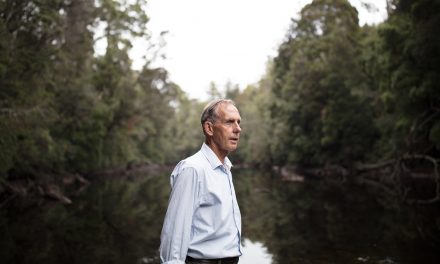A few decades ago, when it was recognised that men have empathy, some jolly person came up with the term Sensitive New Age Guy to describe the male who cares about people and things that are not himself—what PickUp website describes as having “feminine characteristics such as being very timid”.
It is said that many a SNAG can be found in the environment movement. It is also said that the environment movement is home to the SNAG’s diametric, the strong effective woman or, what PickUp fans would call the AWFUL BITCH.
In truth, of course, the movement’s more diverse than this and I for one would place myself in a whole different hollow stereotype that shares characteristics of both of the above and call myself more of a Sensitive yet Cynical Rue Age Girl or—as the Jeep driver who nearly flattened me in the bike lane today would say—(get out of the way you stupid) SCRAG. To explain further, the acronym describes a modern day Girl who is Sensitive (having feelings), Cynical (having eyes) and living in Age that will cause severe Rue as we reminisce from our fire ravaged drought ridden beachless future.
Being sensitive or, as I like to call it, being interested in the wellbeing of others, gives one a large stake in the health of the world because it’s hard to be happy and have a nice time when others are suffering or going extinct. And I dare say there’s many people outside the environment movement, even some very masculine men I suspect, who care about the damage we’re doing to the planet, especially this whole climate change fiasco.
So why are we still stuck here, reading and/or writing articles about the need to take action on climate change, feeling quite appalled and not a bit perplexed about the lack of action actually taking place? After asking lots of people and reading some smart people’s books, I’ve decided the main problem is our brain. It’s programmed to handle global demise the same way as death (i.e. badly) so the only way to seriously examine the question is through the framework of grieving as explained by Psychcentral.com.
Stage 1: Denial
This is when the news is so bad, and its associated emotions so overwhelming, that the truth is too painful to face. We “block out the words and
hide from the facts” as a “response that carries us through the first wave of pain”. How else can we understand the persistent logic declared by world leaders and reported in the press that mining and oil companies making a profit is more important than the world as we know it continuing to exist. I don’t know. But I guess it means we should feel sorry for BP, Exxon and Shell because they are still way back in stage one of their grief. But hold your sympathy for Keystone XL whose newly tendered environmental report on the Canadian tar sands project states that climate change is very real, extremely dangerous and definitely caused by CO2, but anyways, they’ll be extracting and selling oil equivalent to 480 million kg of CO2 per day (see Stage 6: Payoff).
Stage 2: Anger
Reading the last paragraph may have given you a taste of Stage 2, proving that Stage 1 is more conducive to relaxation. Being angry is no fun, it causes you a tummy ache and its raucous expression may result in a slap or arrest. But anger can also be energising, they say. Get out there, they say, let your anger fuel action. Well I say, who wants to be around angry people? You’ll scare all the sensitive people away until climate rallies consist of ten irate red faces spitting contempt at pedestrians.
Psychcentral says now’s the time to “ask for clear answers to your questions”. Stay home and do your research, find out whose fault it really is and how to get them (they didn’t say that last bit), why not start with the Union of Concerned Scientists report on the corporations lobbying against climate action or Crikey’s The Dirty Dozen – Australia’s biggest climate foes. Then best be moving on to Stage 3, yeah?
Stage 3: Bargaining
It seems to me that most of us in the northern suburbs are well ensconced in Stage 3. Sure we’re angry, but our revenge is doing nicely in the fridge, waiting for the appropriate serving time.
How do you bargain with climate change? You buy energy efficient light bulbs and water efficient shower heads, you recycle and compost, write emails to the paper and politicians, grow your own veggies, ride a bike and go to climate rallies. You keep score in your head between headlines like Another year, another failed climate summit and Farmers lead coal seam gas protest by example.
There’s a lot to be said for bargaining, it changes things at a local level, provides a sense of agency and makes life more interesting and tasty. As Psychcentral says, “the normal reaction to feelings of helplessness and vulnerability is often a need to regain control”. Bargaining certainly provides more control than denial or anger, but bargaining is not acceptance. This implies that there’s some reality about climate change we’re still resisting, which is probably because the next stage is:
Stage 4: Depression
An effective method of breaching the comforting arms of Stage 3 is to snuggle up in a comfy chair with hot beverage in hand and tuck into David Spratt and Philip Sutton’s horrifying Climate Code Red or Clive Hamilton’s highly distressing Requiem for a Species. When your brain tries to tell you they’re sci-fi or speculation (Stage 1), accept that both tomes are mired in scientific fact and simple logic. For a more palatable mix of apocalypse and bee keeping, you could opt for Bill McKibben’s Oil and Honey instead.
Why would anyone voluntarily chose depression, you say. Well, I found that I was quite anxious and depressed anyway, before purposely seeking out the gritty facts of climate change. Reading engaging summaries of the havoc to come provided a kind of antidote to not exactly knowing but sensing an unfathomable pending doom. And it freed up a lot of effort previously engaged in converting facts into denial, therefore providing bonus energy for dealing with reality and thus hooning towards the promised land known as:
Stage 5: Acceptance
We are truly in the deepest kind of globalised shit imaginable and nothing we’re currently doing is enough to get us out.
If a significant number of people accepted this position and took the appropriate action, change would be inevitable.
Acceptance would look like hundreds of thousands of people refusing to buy energy generated from coal, pulling their super and investments out of fossil fuels, finding ways to live without reliance on this industry, even if it meant their lifestyle took a shock (it’s not as shocking as a six degree temperature rise).
It would look like hundreds of thousands of people getting physically in the way of deforestation, fossil fuel extraction, transport and production; it would look like politicians afraid of losing the next election if they don’t make drastic changes to investment, infrastructure and law; it would look like leaders of industry who hinder action on climate change facing prosecution and going to jail.
We need the sensitive people to hurry up with their grieving process and get stuck into some hardcore acceptance. We need the insensitive people to grow a pair of tear ducts. We need real action on climate change now.
Are you interested in more from Bushwalking Blog? You can either sign-up for the e-mail newsletter, or get updates via the RSS feed, Facebook or Twitter.





